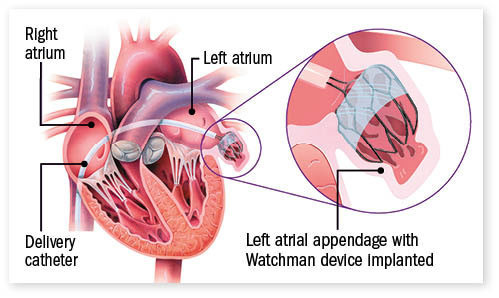
Trying to lose weight? Be careful not to lose muscle

Is your skin problem actually an autoimmune condition?

People with diabetes face higher risk of hearing loss

Antibiotic-free fixes for recurrent UTIs

Musculoskeletal syndrome of menopause: When menopause makes you ache all over

When can older women stop getting mammograms?

To lose weight, especially harmful belly fat, combine diet and exercise

Can men hold off on treating recurring prostate cancer?

The 7 types of rest and why we need them all

What are the early warning signs of cervical cancer?
Medical Devices & Technology Archive
Articles
Experimental wireless pacemaker dissolves when no longer needed
Better blood sugar tracking: A benefit for heart health?
Stroke prevention in atrial fibrillation: Beyond anti-clotting drugs
Wearable devices may encourage enough exercise to prevent afib
Screening for atrial fibrillation: An update
Listen to your heart
Wearable fitness trackers may aid weight-loss efforts
Sensing abnormal heart rhythms with a smart speaker?
Treating sleep apnea: Good for your heart and mind?
Implanted heart device? Beware of newer smartphones and wearables
Research we're watching
People who have an implantable cardioverter-defibrillator (ICD) or pacemaker should avoid the iPhone 12 as well as wearable tech products — such as the Fitbit and Apple Watch — that use magnetic chargers. The magnets in these gadgets can interfere with implanted cardiac devices, possibly rendering them useless, say two recent reports.
A 55-year-old woman wearing an Apple Watch while sleeping was awakened by several beeps from her ICD. A next-day check showed the watch's magnet had deactivated her device, as noted Dec. 12, 2020, in HeartRhythm Case Reports. In the Jan. 4, 2021 HeartRhythm, doctors described how bringing an iPhone 12 near the chest of a person with an ICD immediately disabled the device.

Trying to lose weight? Be careful not to lose muscle

Is your skin problem actually an autoimmune condition?

People with diabetes face higher risk of hearing loss

Antibiotic-free fixes for recurrent UTIs

Musculoskeletal syndrome of menopause: When menopause makes you ache all over

When can older women stop getting mammograms?

To lose weight, especially harmful belly fat, combine diet and exercise

Can men hold off on treating recurring prostate cancer?

The 7 types of rest and why we need them all

What are the early warning signs of cervical cancer?
Free Healthbeat Signup
Get the latest in health news delivered to your inbox!
Sign Up











